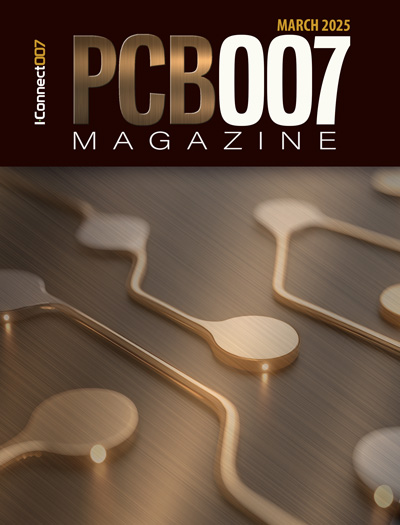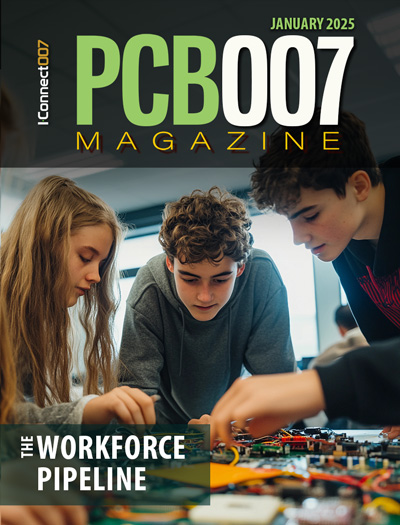-

- News
- Books
Featured Books
- pcb007 Magazine
Latest Issues
Current Issue
The Essential Guide to Surface Finishes
We go back to basics this month with a recount of a little history, and look forward to addressing the many challenges that high density, high frequency, adhesion, SI, and corrosion concerns for harsh environments bring to the fore. We compare and contrast surface finishes by type and application, take a hard look at the many iterations of gold plating, and address palladium as a surface finish.

It's Show Time!
In this month’s issue of PCB007 Magazine we reimagine the possibilities featuring stories all about IPC APEX EXPO 2025—covering what to look forward to, and what you don’t want to miss.

Fueling the Workforce Pipeline
We take a hard look at fueling the workforce pipeline, specifically at the early introduction of manufacturing concepts and business to young people in this issue of PCB007 Magazine.
- Articles
- Columns
Search Console
- Links
- Media kit
||| MENU - pcb007 Magazine
Estimated reading time: 4 minutes
Nolan’s Notes: Plenty to Say About Certification
Certifications, as it turns out, come in some of the most unexpected places. MIT, for example, known for producing some of the top scientific minds in the United States, also has a program for pirates. We hope it’s just an idea meant to bring a bit of levity to what can be a fairly demanding and exacting institution of higher learning.
MIT’s campus is located in the Port district of historic Boston, so it’s easy to imagine privateers and scurvy sailors roaming the cobblestone streets near the MIT campus, possibly hobbling on a wooden leg, one eye covered with a patch, and stumbling along with a bottle of rum. So, it seems quite appropriate MIT now offers a “pirate certificate” designed to recognize a student’s completion of the undergraduate physical education and wellness requirements. To become certified, students must complete courses in archery, fencing, pistol/rifle, and sailing. As we surmised, the certification is purely for entertainment purposes and does not give the recipient a license to engage in piracy or any pirate activities. Bad news for Jack Sparrow if he were looking for some fellow marauders.
So, let’s turn our attention to the electronics manufacturing industry where certifications do, indeed, matter. This issue of SMT007 Magazine tackles the topic by examining the value of certification, where to get certified, and why it matters for both the employer and the employee. Generally speaking, professional certifications don’t give you a license to perform a skill, but they do show competence in an area of knowledge in a standardized manner.
The MIT pirate certificate does raise some good questions, though. A certification has to mean something; otherwise, it’s just for entertainment purposes. Significant work must go into ensuring that the certification criteria are fair and appropriate measures of a specific skill set. Who makes sure the certification is appropriate? Once we achieve a certification, what does that mean in the business environment? Finally, who maintains the timeliness of the certification, and how?
Carlos Plaza of IPC helps us understand the nuances between certifications and being certified. He clarifies who these oversight entities might be. One example could be a government agency that authorizes vehicle operation licenses. Those are certifications that give the holder legal authorization to operate that vehicle. Another example is the bar exam, which authorizes the holder to represent others as an attorney in a particular state or country. Interestingly enough, one is not required to sit through a series of courses to take the bar exam. Of course, it might be helpful, but it’s not required. This is not the case with all certifications and licensures.
In the EMS industry, most certifications are administered within the industry, either internally within the company or through a third-party organization. It is up to these organizations to continually assess the validity of the certifications offered, and to analyze whether training courses must be developed to support the certification. After all, how do individuals obtain the skills they will be certified upon?
What is true in our industry today is that customers value—and even require—employee certification in skill areas that matter to their products. Through our interviews, we learned that when all things are equal between two assembly houses, the customer is likely to choose the vendor with more industry-recognized certifications on board.
For the July 2024 issue of SMT007 Magazine, I spoke with three EMS providers about their experiences with training and certification. IPC and SMTA, two associations with a vested interest in certifications, offer opinions about how, where, and when to get certified. They also share information about available resources.
Also in this issue, Dr. Jennie Hwang reports on her annual visit to the Berkshire Hathaway annual meeting, columnist Mike Konrad shares his insight on certification, we introduce you to fabricator and new I-Connect007 columnist, Tom Yang of CEE, plus we spotlight a new intermediate training course on counterfeit component risk mitigation.
I’m still intrigued by MIT’s pirate offerings, and I’ve reached out to learn more. Should I assume they will add other pirate-worthy skills, such as parlay tactics and self-governance out of the philosophy department? Cannonball ballistics probably can be picked up somewhere in the mathematics curriculum. Sept. 19 is International Talk Like a Pirate Day, so the linguistics department may be of help in mastering that skill. Of course, being what high-tech navigation systems are today, no self-respecting pirate would dare sail his ship into open waters without having taken several electronics courses to fully understand how to run his ship.
In short, certifications matter. Read this issue and shore up your knowledge—or yer be walkin’ the plank, matey.
This column originally appears in the July 2024 issue of SMT007 Magazine.
More Columns from Nolan's Notes
Nolan’s Notes: Your Golden TicketNolan's Notes: Find the Help You Need—Accessing Technical Resources
Nolan’s Notes: Emerging Trends in 2025
Nolan’s Notes: Soldering Technologies
Nolan's Notes: The Rise (and Risk) of Data
‘Deepfake’ Components
Solder Printing: A 1:1 Ratio of Technical and Creative
Nolan’s Notes: What It Means to Thrive


